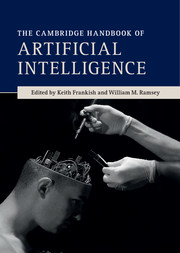3 - Philosophical challenges
Published online by Cambridge University Press: 05 July 2014
Summary
Descartes (1637/1931, p. 116) held that our reason was a “universal instrument.” Since he believed that any mechanism has to have some special purpose, and that no collection of special purpose mechanisms could be large enough to encompass all that reason can do, he concluded that no mechanism could instantiate human reason. Aquinas (1265–72, I, Q.75, a. 2) also argued that intellect was not provided by a material organ. He believed that a disease-induced bitter humor could interfere with our tasting sweetness, or any taste different from bitter. Analogously, he thought that if our intellects were material, they would be prevented from knowing material things of different natures.
Most contemporary philosophers would accept that our intelligence is provided by our material brains, and thus would be disinclined to challenge the possibility of artificially intelligent devices on the ground of their materiality. The questions and problems about artificial intelligence that remain can be divided into those that are largely independent of particular approaches to AI, and those that are prompted by more specific ideas about artificially realizable cognitive architectures. We shall begin with the more general issues.
Keywords
Information
- Type
- Chapter
- Information
- The Cambridge Handbook of Artificial Intelligence , pp. 64 - 86Publisher: Cambridge University PressPrint publication year: 2014
References
Accessibility standard: Unknown
- 4
- Cited by
